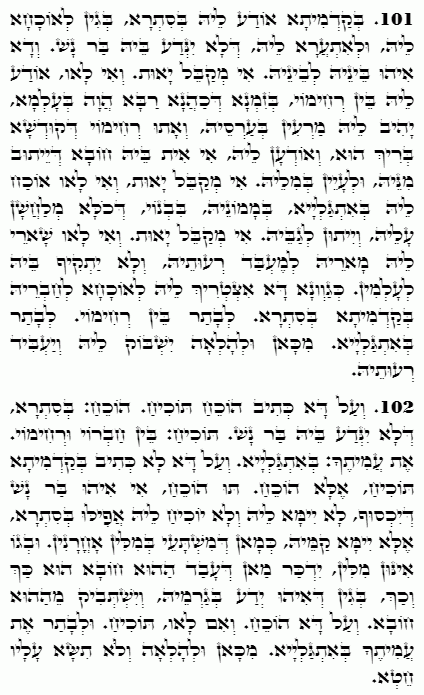Daily Zohar # 4607 – Kedoshim – Be sensitive about it
Daily Zohar 4607

Hebrew translation:
102. וְעַל זֶה כָּתוּב הוֹכֵחַ תּוֹכִיחַ. הוֹכֵחַ – בַּסֵּתֶר, שֶׁלֹּא יֵדַע בּוֹ בֶּן אָדָם. תּוֹכִיחַ – בֵּין חֲבֵרָיו וְאוֹהֲבָיו. אֶת עֲמִיתֶךָ – בְּגָלוּי. וְעַל כֵּן לֹא כָתוּב בָּרִאשׁוֹנָה תּוֹכִיחַ, אֶלָּא הוֹכֵחַ. וְעוֹד הוֹכֵחַ – אִם הוּא אָדָם שֶׁיִּתְבַּיֵּשׁ, לֹא יֹאמַר לוֹ וְלֹא יוֹכִיחַ אוֹתוֹ אֲפִלּוּ בַּסֵּתֶר, אֶלָּא יֹאמַר לְפָנָיו כְּמִי שֶׁמְּסַפֵּר בִּדְבָרִים אֲחֵרִים. וּבְתוֹךְ אוֹתָם דְּבָרִים יַזְכִּיר מִי שֶׁעוֹשֶׂה אוֹתוֹ הַחֵטְא הוּא כָּךְ וְכָךְ, כְּדֵי שֶׁהוּא יֵדַע בְּעַצְמוֹ וְיַעֲזֹב אֶת אוֹתוֹ הַחֵטְא. וְעַל כֵּן הוֹכֵחַ. וְאִם לֹא – תּוֹכִיחַ. וְאַחַר כָּךְ אֶת עֲמִיתֶךָ – בְּגָלוּי. מִכָּאן וָהָלְאָה – וְלֹא תִשָּׂא עָלָיו חֵטְא.
.
Zohar Kedoshim
Continued from previous DZ
#101
In the beginning, He informs him secretly to rebuke him and awaken him so that no one else knows. This is between the two. If he accepts the rebuke, it is good. If not, He informs him among his friends. When the High Priest was in the world, He would afflict him with illness in his bed, and the beloved ones of the Holy One, Blessed be He, would come and inform him that if there is any fault in him, he should repent and examine his deeds. If he accepts, it is good. If not, He rebukes him openly by punishing him through his wealth or his children so that everyone whispers about him and comes to awaken him to repentance. If he accepts, it is good. If not, his Master begins to do His will and no longer troubles him.
Similarly, one should rebuke his friend. First in secret, then among his friends, and finally openly. After that, he should leave him to act according to his own will.
#102
Therefore, it is written, “הוֹכֵחַ תּוֹכִיחַ,” “You shall surely rebuke your neighbor” (Leviticus 19:17). This means “rebuke” (הוֹכֵחַ), in secret, so that no one else knows. “Rebuke” (תּוֹכִיחַ), among his friends and loved ones. “Your neighbor” (אֶת עֲמִיתֶךָ), means openly. Therefore, it does not initially say “rebuke” (תּוֹכִיחַ), which implies among friends, but rather “rebuke” (הוֹכֵחַ) in secret.
Additionally, “rebuke” (הוֹכֵחַ), if he is a person who is easily embarrassed, do not tell him directly or rebuke him, even in secret. Instead, speak in his presence as if telling a different story, and amid these words, mention someone who committed a similar sin and what should be done so that he understands on his own and leaves the sin. Therefore, it says “rebuke” (הוֹכֵחַ). If this does not work, then “rebuke” (תּוֹכִיחַ), and afterward, openly, “your neighbor” (את עמיתך), as mentioned above. From that point onward, “and you shall not bear sin because of him” (וְלֹא תִשָּׂא עָלָיו חֵטְא), meaning do not rebuke him further.
Lesson;
The initial rebuke is done secretly to avoid public shame and allow the person to correct his behavior privately. If the secret rebuke is not accepted, it is given among friends who can help influence the person to repent. If the rebuke among friends is still not accepted, it becomes public, often through misfortunes that others notice, encouraging the person to reflect on his actions.
The method of rebuke mirrors how the Holy One, Blessed be He, rebukes, escalating from private to public admonition, showing care and patience in the process. If all forms of rebuke fail, the person is left to act according to his will, indicating that the responsibility to rebuke has been fulfilled.
When dealing with someone who is easily embarrassed, indirect methods of rebuke should be used, allowing the person to realize and correct their mistake without direct confrontation.
This Zohar teaching emphasizes the importance of sensitivity, discretion, and a structured approach to rebuking someone. It ensures that it is done with the intention of helping the person making corrections without causing unnecessary shame or discomfort.
{||}

 Previous: Kedoshim
Previous: Kedoshim

